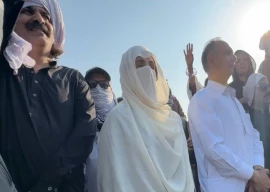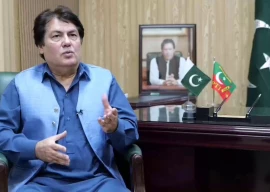
The Lahore High court (LHC) resumed its hearing of a contempt of court petition against President Asif Ali Zardari Friday, with the full bench declaring that the defiance of the court’s judgments amounted to “shaking the foundation of the Constitution”.
“The Constitution does not allow anyone to commit any unconstitutional act,” the bench remarked. However, judges sitting on the five-member bench questioned whether the president could be taken to court during his tenure in the office.
Headed by Chief Justice Umar Ata Bandial, the bench comprised Justice Nasir Saeed Sheikh, Justice Sheikh Najamul Hassan, Justice Ijazul Ahsan and Justice Syed Mansoor Ali Shah.
Representing the petitioner were Advocates AK Dogar and Azhar Siddique, who tried to establish that the constitutional immunity enjoyed by President Zardari and others was not only in conflict with multiple articles of the Constitution but also a violation of the basic spirit of Islam.
Citing judgments of the Supreme Court, the counsels said that if the president committed any crime in a personal capacity, he would be liable to be punished like an ordinary citizen.

Justice Shah remarked that state functionaries were not answerable for their official acts but they were bound to obey the court’s orders. Shah also asked the counsels, hypothetically, if the president would be punished if he committed a murder the day after taking oath. Advocate Dogar replied that the murder would be considered a personal act committed by the president and that the Constitution does not provide any protection to that end. Chief Justice Bandial, however, observed that act of murder was supposed to be intentional, while any other illegal act could be unintentional.
Challenging Article 248 of the Constitution, Dogar stated that the SC had already declared that the immunity granted to President and others was also against the powers of the judiciary.
“The creation of a special group of public office holders poses a serious threat to the independence of the judiciary,” he said in his arguments.
He went on to say that, by creating the immunity law, public office holders had betrayed the trust of the people. In Islam, he added, there is no difference between high and low in application of the law.
The judges also asked the petitioner’s counsel to argue on whether courts could take action against the president after his tenure was over.
During the course of the arguments, Additional Attorney General, Abdul Hayee Gillani, told the bench that immunity enjoyed by the president under Article 248(2) was also mentioned in a letter written to the Swiss government on the directives of the Supreme Court. Advocate Dogar, however, argued that the letter did not contain any mention of immunity, adding that it could be produced before the bench during the next hearing.
The counsel reiterated that the Constitution did not provide any protection to acts committed by any public office holder in a personal capacity.
The bench adjourned the hearing until Dec 10 and asked the counsels to come up with arguments on the jurisprudence relation between sub-clauses 1, 2 and 3 of Article 248 of the Constitution.
Published in The Express Tribune, December 8th, 2012.
COMMENTS (1)
Comments are moderated and generally will be posted if they are on-topic and not abusive.
For more information, please see our Comments FAQ








1732643921-0/4548774-1403918848-(1)1732643921-0-270x192.webp)








I seriously question the reliability of our judicial system. The man in question completed his 5 years tenure with ease. During these 5 years Pakistan has made it top the of the list for most corrupt countries on the planet. Now elections are close and the justice system still hasn't done anything about it.
Sometimes I feel we live in a banana republic. Where the rule of law is only for the common man and not the powerful. I guess it's about time I move abroad as well since the conditions here are getting worse and worse for every man.